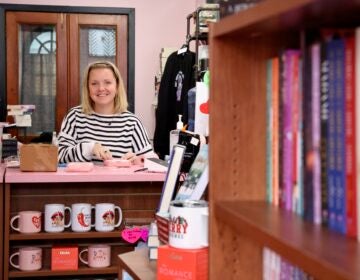On his new podcast, LeVar Burton has it all: ‘A microphone, a good story, and my voice’
WHYY Morning Edition host Jennifer Lynn spoke with actor LeVar Burton ahead of his appearance at the Scottish Rite Auditorium in Collingswood, New Jersey Tuesday evening.
Listen 6:13
LeVar Burton is taking his story-reading podcast on the road with an appearance Tuesday evening at the Scottish Rite Auditorium in Collingswood, New Jersey. (Stitcher)
Many millennials grew up listening to actor LeVar Burton read them children’s stories on the PBS series “Reading Rainbow.” Now, he hopes they’ll embrace him as grown-ups and tune into his podcast “LeVar Burton Reads,” in which he reads short fiction stories he chooses himself. Burton has been taking the show on the road, reading stories to live audiences.
Ahead of his appearance at the Scottish Rite Auditorium in Collingswood, New Jersey on Tuesday evening, WHYY Morning Edition host Jennifer Lynn spoke with Burton about his recognizable voice, and whether he needs to make adjustments when reading to kids or adults.
—
Zero.
Zero?
No adjustment necessary. No. I mean it’s really the text that dictates the the energy level, the voices, but the process is absolutely the same. It’s me interpreting the writer’s words. I’m the same guy whether I’m reading to adults or to kids.
What do you think adults want from storytelling?
The same thing children want: to be engaged in their imagination, to be entertained, to be delighted or intrigued or scared. Stories serve as an integral part of the human experience.
Millennials grew up with you through “Reading Rainbow.” That generation is so digital device savvy. Is digital ideal when championing a love of literature and language?
It is ideal for the generation that has grown up with the digital form as their native modality. They won’t miss what the previous generation bemoans that they miss with words on a printed page. They just don’t have that prejudice because they’ve grown up in a different world with a different reality.
LeVar, does podcasting give you the creative feel that you need to help people experience stories?
Yes, but for me it was ideal because there was no barrier to entry. There was no studio executive or network president who could give me permission or deny me permission. All I needed was a microphone, a good story, and my voice. I love that sort of creative freedom.
What podcasts do you listen to?
Well, right now, being on the road I don’t have a chance to listen to many other podcasts, but I’m a big fan of “Lore.” I love “The Read,” “The Nod.”
Whose voice do you love listening to?
I love listening to Ira Glass and his show “This American Life” has been a staple in my own life. I’m accustomed to his voice, his rhythms, his intonations. I love Ira Glass.
Well, it’s interesting because Ira Glass’ voice to me is such a free fall — even sometimes he has a little marble mouth, if you know what I mean, but you’re very measured, you’re very measured. It’s a very different voice.
Well yeah, but again it’s what you’re used to. I think the reason why my podcast is as popular as it is is because, you know, this generation of millennials is accustomed to hearing my voice. We like what we like and we tend to like that which we are used to.
What came into play to build the voice that you have?
A lot of training from my time at USC (University of Southern California) as a theater major and then just 40 years of putting into practice. I think the seven years that I spent on “Star Trek: The Next Generation” playing Geordi, the chief engineer, and having my eyes covered forced me to discover ways to communicate subtly with voice — as much as a pain in the ass as it was to have my eyes covered for seven years.
Now, that’s interesting. What grates on your ears?
Nails on a chalkboard. Not not a good thing. I tend to shy away from high-pitched voices. Southern women with very high-pitched voices … That’s just anathema to me.
You’re going to get some letters from Southern women now.
I’m sorry. Come at me. Go ahead.
In your podcast you pepper in some music. When can it get in the way?
When it’s overused. You know, we try on the podcast to be really judicious with music cues. It’s more sound design that we’re interested in.
I read an interview I think from a public radio station in California speaking with you some time ago and you were the guest deejay and you’ve played some Jimi Hendrix and you played some Joni Mitchell. Oh, I know you played some Dianne Reeves.
Ah, yeah.
Testify.
It’s an anthem of mine. Yeah, that song.
How’s that?
Well, she says in the song, “Sometimes you won’t understand why life is the way it is.” But I believe she says that God and time are synonymous. And through time, God reveals all things, and I genuinely believe that. But she goes on to say, “Be still. Stand in love and pay attention.” Be still because unless we spend some time in stillness, we’ll never be able to hear that inner voice that guides us. Standing in love is the only sane response that I have been able to discern for being human. And pay attention because if we’re not paying attention, we might miss something that’s critically important to our journey in life.
—
LeVar Burton brings his podcast “LeVar Reads” to the Scottish Rite Auditorium in Collingswood, New Jersey on Tuesday evening. He’ll be reading the work of Samuel R. Delany, who will also be on hand for a Q&A with LeVar.
WHYY is your source for fact-based, in-depth journalism and information. As a nonprofit organization, we rely on financial support from readers like you. Please give today.





